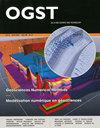油菜籽-柴油-正丁醇混合燃料压缩点火发动机的燃烧特性
IF 1.8
4区 工程技术
Q4 ENERGY & FUELS
Oil & Gas Science and Technology – Revue d’IFP Energies nouvelles
Pub Date : 2021-01-01
DOI:10.2516/OGST/2021001
引用次数: 3
摘要
用于压缩点火发动机的液体生物燃料通常以植物油为基础。为了在压缩点火发动机中使用,由于植物油的高粘度,必须对其进行加工,或者也可以在燃料混合物中使用植物油。为了降低含有粗植物油的燃料混合物的粘度,可以使用醇基燃料外加剂。研究了油菜籽-柴油-正丁醇混合燃料对增压压燃式发动机燃烧特性和固体颗粒生成的影响。对混合燃料中10%和20%正丁醇的浓度进行了测量和分析。发动机Zetor 1204,位于拖拉机Zetor Forterra 8641,功率为60kW,采用直喷。利用MAHA ZW500移动测功机通过拖拉机的动力取轴装载发动机。测量是在20%、60%和100%发动机负荷的稳定条件下进行的。发动机的转速保持在每分钟1950转。试验表明,混合燃料产生的固体颗粒比柴油少,汽缸压力峰值也较低,随着混合燃料中正丁醇浓度的增加,燃烧延迟时间延长,燃烧预混阶段增加。本文章由计算机程序翻译,如有差异,请以英文原文为准。
Combustion characteristics of compression ignition engine fuelled with rapeseed oil–diesel fuel–n-butanol blends
Liquid biofuels for compression ignition engines are often based on vegetable oils. In order to be used in compression ignition engine the vegetable oils have to be processed because of their high viscosity or it is also possible to use vegetable oils in fuel blends. In order to decrease the viscosity of the fuel blends containing crude vegetable oil the alcohol-based fuel admixtures can be used. The paper describes the effect of rapeseed oil–diesel fuel–n-butanol blends on combustion characteristics and solid particles production of turbocharged compression ignition engine. The 10% and 20% concentrations of n-butanol in the fuel blend were measured and analysed. The engine Zetor 1204, located in tractor Zetor Forterra 8641 with the power of 60kW and direct injection was used for the measurement. The engine was loaded through power take off shaft of the tractor using mobile dynamometer MAHA ZW500. The measurement was carried out in stabilized conditions at 20%, 60% and 100% engine load. The engine speed was kept at 1950 rpm. Tested fuel blends showed lower production of solid particles than diesel fuel and lower peak cylinder pressure and with increasing concentration of n-butanol in the fuel blend the ignition delay was prolonged and premixed phase of combustion was increased.
求助全文
通过发布文献求助,成功后即可免费获取论文全文。
去求助
来源期刊
CiteScore
2.70
自引率
0.00%
发文量
0
审稿时长
2.7 months
期刊介绍:
OGST - Revue d''IFP Energies nouvelles is a journal concerning all disciplines and fields relevant to exploration, production, refining, petrochemicals, and the use and economics of petroleum, natural gas, and other sources of energy, in particular alternative energies with in view of the energy transition.
OGST - Revue d''IFP Energies nouvelles has an Editorial Committee made up of 15 leading European personalities from universities and from industry, and is indexed in the major international bibliographical databases.
The journal publishes review articles, in English or in French, and topical issues, giving an overview of the contributions of complementary disciplines in tackling contemporary problems. Each article includes a detailed abstract in English. However, a French translation of the summaries can be provided to readers on request. Summaries of all papers published in the revue from 1974 can be consulted on this site. Over 1 000 papers that have been published since 1997 are freely available in full text form (as pdf files). Currently, over 10 000 downloads are recorded per month.
Researchers in the above fields are invited to submit an article. Rigorous selection of the articles is ensured by a review process that involves IFPEN and external experts as well as the members of the editorial committee. It is preferable to submit the articles in English, either as independent papers or in association with one of the upcoming topical issues.

 求助内容:
求助内容: 应助结果提醒方式:
应助结果提醒方式:


